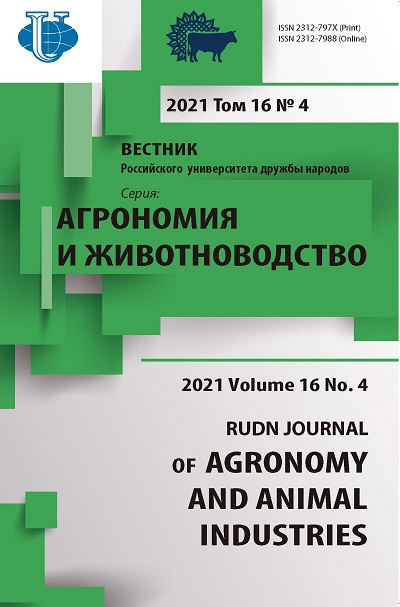Biological and economic evaluation of AMISTAR Gold fungicide against sunflower rust in the Lower Volga region
- Authors: Parpura D.I.1, Sidortsov A.I.2, Atmachyan G.P.1
-
Affiliations:
- Russian Peoples’ Friendship University
- Saratov State Vavilov Agrarian University
- Issue: Vol 16, No 4 (2021)
- Pages: 353-361
- Section: Plant protection
- URL: https://agrojournal.rudn.ru/agronomy/article/view/19702
- DOI: https://doi.org/10.22363/2312-797X-2021-16-4-353-361
- ID: 19702
Cite item
Full Text
Abstract
Rust is one of the most economically important foliar diseases of sunflower. The problem of sunflower disease control was considered. The article presents the results of a two-year experiment studying the efficiency of AMISTAR® Gold fungicide, concentrated suspension (active ingredient: Azoxystrobin 125 g/L, Difenoconazole 125 g/L) in sunflower hybrids in the Lower Volga region. Flowerbud development stage was the best application timing for increasing productivity. Therefore, sunflower yield averaged 3…4 c/ha. The biological efficiency of the fungicide ranged from 85 to 90 %. The calculation of economic efficiency showed 145…255 % profitability depending on the year.
Keywords
Full Text
Table 1. Development and spread of sunflower rust (Puccinia helianthi Schw.) and biological efficiency of the fungicide
Disease symptoms | Variants | |||||
AMISTAR Gold, SC | AMISTAR Gold, SC | Control | ||||
Alkantara | SI Rozeta KLP | Alkantara | SI Rozeta KLP | |||
Before application | 28 days after application | Before application | 28 days after application | After 28 days | After 28 days | |
2020 | ||||||
Development,% | 1.4 | 0.5 | 3.6 | 1.1 | 11.3 | 14.2 |
Prevalence,% | 34.3 | 9.4 | 43.7 | 12.5 | 87.1 | 94.4 |
Biological efficiency,% | — | 89.2 | — | 86.8 | — | — |
2021 | ||||||
Development,% | 5.1 | 1.6 | 9.8 | 3.5 | 21.1 | 23.9 |
Prevalence,% | 52.4 | 12.3 | 73.4 | 14.9 | 100 | 100 |
Biological efficiency,% | — | 87.7 | — | 85.1 | — | — |
Table 2. Average yield and economic efficiency of AMISTAR Gold fungicide application
Hybrid | Yield at standard moisture content (7 %), c/ha | Yield, c/ha | Value of crop including cost of fungicide and treating, rubles/ha | Economic efficiency of fungicide application,% | |
Control (untreated) | AMISTAR Gold 1 L/ha | ||||
2020 | |||||
Alkantara | 26.70 | 30.95 | 4.25 | 9 156 | 254.8 |
SI Rozeta KLP | 24.57 | 27.75 | 3.18 | 5 946 | 165.4 |
2021 | |||||
Alkantara | 20.37 | 23.63 | 3.26 | 6 186 | 172.1 |
SI Rozeta KLP | 19.92 | 22.86 | 2.94 | 5 226 | 145.4 |
About the authors
Denis I. Parpura
Russian Peoples’ Friendship University
Author for correspondence.
Email: 1032163741@rudn.ru
post-graduate student, Agrobiotechnological Department
6 Miklukho-Maklaya st., Moscow, 117198, Russian FederationAnton I. Sidortsov
Saratov State Vavilov Agrarian University
Email: 1032163741@rudn.ru
student, Faculty of Agronomy
1 Teatralnaya ploshchad, Saratov, 410012, Russian FederationGaik P. Atmachyan
Russian Peoples’ Friendship University
Email: atmachiangp@rudn.ru
Post-graduate student, Agrobiotechnological Department
6 Miklukho-Maklaya st., Moscow, 117198, Russian FederationReferences
- Lukomets VM, Zelentsov SV, Krivoshlykov KM. Outlook and reserves the expansion of oil crops production in the Russian Federation. Maslichnye kul’’tury. Nauchno-tekhnicheskii byulleten’ VNIIMK. 2015; (4):81—102. (In Russ.).
- Lukomets VM, Piven VT, Tishkov NM. Sunflower protection from pests and diseases. Plant protection and quarantine. 2007; (5):14—16. (In Russ.).
- Saskevich PA, Ustinova NV. Motoring of diseases of the leaf apparatus of sunflower in the north-east of Belarus. Bulletin of the Belarussian state agricultural academy. 2018; (4):105—110. (In Russ.).
- Vypritsky AS, Plakhotnik VV, Vypritskaya AA. Pathogens of potentially dangerous diseases of sunflower in Central Chernozem region. In: Biological plant protection — the basis for stabilizing agroecosystems: conference proceedings. Krasnodar; 2006. p.134—136. (In Russ.).
- Detsyna AA, Tereshchenko GA, Illarionova IV. The prevalence of rust on sunflower varieties in the Krasnodar Territory. Maslichnye kul’’tury. Nauchno-tekhnicheskii byulleten’ VNIIMK. 2018; (2):101—106. (In Russ.). doi: 10.25230/2412-608X-2018-2-174-101-106
- Araslanova NM, Antonova TS, Iwebor MV, Khatnyansky VI. Race identification of isolates of Puccinia helianthi Schwein. that affects sunflower in some regions of Russia. Maslichnye kul’’tury. Nauchno-tekhnicheskii byulleten’ VNIIMK. 2019; (4):107—112. (In Russ.). doi: 10.25230/2412-608X-2019-4-180-107-112
- Sackston WE. Studies on sunflower rust: III. Occurrence, distribution, and significance of races of Puccinia helianthi Schw. Canadian Journal of Botany. 1962; 40(11):1449—1458. doi: 10.1139/b62-139
- Kuzmina GN, Vasina MV. Transmission of sunfl diseases through seeds as a factor in the preservation of infection. In: Postindustrial world: science in the dialogue between the East and the West: conference proceedings. Ust-Kamenogorsk: Manzholov East Kazakhstan State University publ.; 2011. p.199—204. (In Russ.).
- Lukomets VM, Piven VT, Tishkov NM, Shulyak II. Sunfl protection. Plant protection and quarantine. 2008; (2):78—108. (In Russ.).
- Anisimova IN, Alpatieva NV, Karabitsina JI., Kuznetsova EB, Rozhkova VT, Gavrilova VA. Identifi of genes encoding economically valuable characters of sunflower by molecular screening. Achievements of Science and Technology in Agro-Industrial Complex. 2015; 29(7):39—42. (In Russ.).
- Pluzhnikova II, Kriushin NV. Effect of fungicides and timing of application on the intensity of development of rust on plants of sunflower. International agricultural journal. 2018; (5):62—65. (In Russ.). doi: 10.24411/2587-6740-2018-15080
- Shulyak II, Muradasilova NV. The dates of implementation of protective procedures against sunflower diseases. Maslichnye kul’’tury. Nauchno-tekhnicheskii byulleten’ VNIIMK. 2016; (1):100—105. (In Russ.).
- Pluzhnikova II, Kriushin NV. Evaluation of the effectiveness of the use of fungicides on sunflower plants in different phases of its development. International agricultural journal. 2021; 64(2):61—64. (In Russ.). doi: 10.24412/2587-6740-2021-2-61-64
- Beglyarov GA. (ed.) Khimicheskaya i biologicheskaya zashchita rastenii [Chemical and biological protection of plants]. Moscow: Kolos publ., 1983. (In Russ.).
- Popov SY, Dorozhkina LA, Kalinin VA. Osnovy khimicheskoi zashchity rastenii [Fundamentals of chemical plant protection]. Moscow: Art-Lion publ.; 2003. (In Russ.).
Supplementary files














